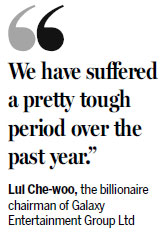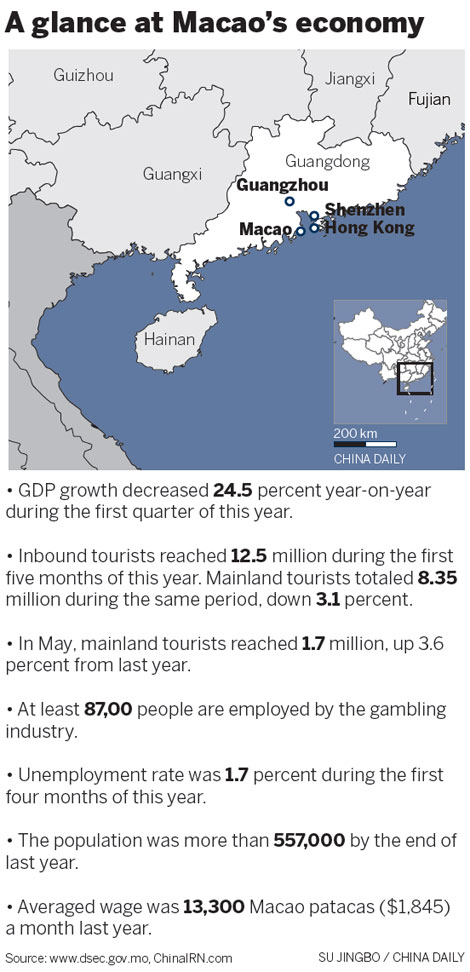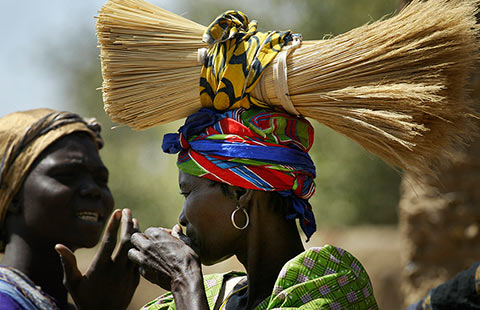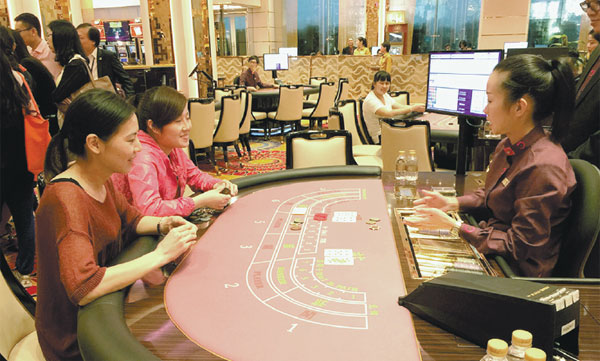Macao spins the wheel to drive tourism sector
Updated: 2015-07-06 07:02
By Chen Jia in Macao(China Daily)
|
||||||||
Vacation island moves into more mainstream entertainment in a bid to attract families and younger visitors
Cheng Koon-man made the right decision when he opened a second restaurant in Macao deep in the heart of a new bustling shopping precinct.
As crowds of customers stream in and out of Wong Kung Sio Kung, Cheng's smile of satisfaction reflects his hopes for the future in this Special Administrative Region.
|
Mainland tourists play at the Galaxy Macao casino on Taipa Island in Macao. The annual income from Macao's gambling industry was $44 billion in 2014, down by 2.55 percent compared with 2013. Chen Jia / China Daily |
"The business is better than I expected since I opened on May 27 as more tourists have visited Galaxy Macao and Broadway Macao for shopping, watching shows and eating out," the Macao-born restauranteur said, adding that he opened his first restaurant in the old city quarter of the island in 2000.
Broadway Macao is a vibrant new area modeled on New York's Broadway theaterland. It was built by one of the big casino operators - Galaxy Entertainment Group Ltd, and opened this year.
Along the crowded street, more than 30 shops and restaurants cater for thousands of tourists that throng the area, searching for a little piece of old Macao. "We specialize in shrimp roe noodles and sea crab congee," Cheng said. "And the tourists like what we are doing."
Less than a minute's walk from his restaurant and over a pedestrian bridge from Broadway Macao is GEG's new complex of casinos, shopping malls and six world-class hotels.
The Hong Kong-listed resort company has pumped HK$43 billion ($5.5 billion) into its Macao venture in the past four years, which has doubled in size. The Galaxy Macao and Broadway Macao complex now stands in 1.1 million square meters or the size of more than four Bird's Nest Olympic stadiums.
"Rooted in Macao, we are aligned with the central government's vision to help the territory fulfill its potential as a world center of tourism and leisure, contributing to Macao's long-term growth," Lui Che-woo, the billionaire chairman of GEG, said at the opening of the second phase of the Galaxy Macao and Broadway Macao projects.
Plans to further expand the GEG brand by opening a third and fourth phase are underway at a cost of around HK$57 billion as the company looks to attract more traditional tourists. "The non-gambling element of our business will develop faster in the future," said Francis Lui, deputy chairman of the GEG.
Situated on the western side of the Pearl River Delta across from Hong Kong, Macao is known for its glitzy casinos, high-rollers and weekend gamblers. But that is starting to change as the island moves into the mainstream tourism market to make up for the fall in gambling revenue, which has been hit by the government's anti-corruption drive.
Last year, annual income from the gaming industry was $44 billion, down by 2.55 percent compared to 2013, figures from the Gaming Inspection and Coordination Bureau of the Macao Special Administrative Region show.
It was the first annual decline since records began in 2002. Then last month, gambling revenue dropped by 36.2 percent to $2.2 billion compared with the same period last year. That was slightly better than May's figures, which showed a 37 percent fall.
As the sector makes up about 80 percent of Macao's GDP, creating a new income stream has become a priority.
Already there have been warning signs about the depth of the slowdown. GDP on the island dropped by 24.5 percent in the first quarter compared with the same period last year because of falling revenue from casinos.

"Macao faces a restructuring period," Chui Sai-on, chief executive of the Macao Special Administrative Reg-ion, wrote in his annual work report. "Macao should develop into a tourism and leisure center to offset the falling gaming sector (revenue)."
In December 2014, President Xi Jinping urged the island to "nurture new growth areas" during a visit to Macao. To do this, the island must attract more traditional tourists.
Resort operators are trying to do just that. GEG is targeting the mainland market as well as visitors from South Korea, Japan and countries in Southeast Asia.
Walking through the Galaxy Macao complex, you can reach luxury hotels that line the resort. There is the Ritz-Carlton "first all-suite" hotel along with Asia's largest JW Marriott. Next door are the Banyan Tree Macao, Hotel Okura Macao and Galaxy Hotel, providing about 4,000 rooms all together.
At 574 meters, the Skytop Adventure Rapids at JW Marriott is the world's longest water run and was built to entice families and a new generation of tourists.
Other resorts are also looking to expand their reach. Next to the Galaxy Macao is the Studio City Macao, owned by Melco Crown Entertainment Ltd.
Melco expects to complete the tallest Ferris wheel in Asia by the end of this year to attract young families. Sands China Ltd is building a $1.7 billion resort, which will feature a half-size replica of the Eiffel Tower.
"We have suffered a pretty tough period over the past year," Lui, of GEG, said.
"The market environment now is quite different from a year ago, which made us consider diversifying the business."
With 65 percent of the island's visitors coming from the mainland, Macao's gaming industry suffered during the government's anti-corruption campaign.
The number of VIP gamblers, who are prepared to wager at least HK$1 million, fell dramatically. VIP gamblers contribute more than two-thirds of the total gaming revenue in Macao.
"The headwind from the anti-corruption (campaign) influenced all the casinos in Macao, especially the GEG and SJM Holdings Ltd, as they have more than 50 percent of the VIP gambling market," said David Green, founder of Newpage Consulting, which specializes in gaming research.
While the VIP business slowed, the mass market sector increased last year. Statistics from Macao Government Tourist Office reported that more than 31.5 million tourists visited the island in 2014, with 21 million coming from the mainland.
Hopefully, that trend will continue now that the entry permit policy for mainland passport holders has been changed to allow local tourists to stay up to a week instead of five days, according to a Xinhua report.
"The visa relaxation decision should help improve sentiment in the sector," DS Kim, an analyst at JP Morgan Chase & Co, said in a note reported by Bloomberg.
Still, resort companies such as GEG are expanding their interests just outside Macao. Ye Yanmin, senior vice-president of the group, said the entertainment company was working on a resort project at Hengqin Island without disclosing how much it would cost.
A special economic zone in Zhuhai, Guangdong province, Hengqin has a connecting bridge to Macao, which was opened in 2009.
"The project will focus on leisure and entertainment, such as a golf course and a resort. We are confident about this development, as the economic zone of the Pearl River Delta will be a big and broad market," Ye said.
"Convenient transportation will connect Macao with Hong Kong, Zhuhai and Guangzhou to provide more business opportunities."
chenjia1@chinadaily.com.cn

(China Daily 07/06/2015 page13)
- Veterans mark the beginning of the War of Resistance against Japanese Aggression
- Dalai Lama's 80th birthday celebrations politicized: expert
- Broadcasting cooperation strengthened along Belt and Road
- 14 dead in East China shoe factory collapse
- Four dead, 48 injured as earthquke hits Xinjiang
- Beijing's PM2.5 density markedly lower
- Injured ROK tourists in intensive care
- 36 dead, 26 missing after banca capsized in C. Philippines
- Thai navy plans to buy three Chinese subs
- Mass casualties in Indonesian military plane crash
- Japan's LDP lawmaker denounces Abe's security policies
- More than 100 feared dead in Indonesian military plane crash

 Ten photos you don't wanna miss - Weekend special
Ten photos you don't wanna miss - Weekend special
 US beat Japan 5-2 to win Women's World Cup
US beat Japan 5-2 to win Women's World Cup
 Veterans of World War II honored
Veterans of World War II honored
 The world in photos: June 29 - July 5
The world in photos: June 29 - July 5
 Top 10 most expensive cities in the world
Top 10 most expensive cities in the world
 Italian designer tailors success in China
Italian designer tailors success in China
 People take part in Independence Day parade in Washington
People take part in Independence Day parade in Washington
 Unusual heat wave sweeps across Europe
Unusual heat wave sweeps across Europe
Most Viewed
Editor's Picks

|

|

|

|

|

|
Today's Top News
Chinese stocks struggle to maintain rally in afternoon
Greece enters uncharted territory after referendum 'no' vote
Chinese embassy warns travelers to be careful in Turkey
China nominates Jin Liqun AIIB's president-designate
For PetroChina, move to Houston pays off
China-France ties 'benefit all'
Concern over US military strategy
Will Alibaba, Amazon clash?
US Weekly

|

|








